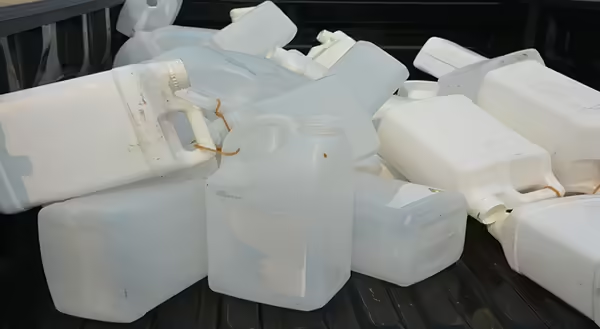
The Illinois Department of Agriculture has announced the single-day collection sites and dates for the 2024 Pesticide Container Recycling Program. Dates and locations are available on the Illinois Department of Agriculture website's press release.
Year-round disposal is available at three permanent collection sites. Please call to ensure the facility will be open.
- Griggsville, IL. Logan Agri Sry, Inc., contact Troy Kennedy, 217-833-2375
- Lawrenceville, IL. Klein Flying Service, contact Ryan Klein, 812-890-6685
- Carmi, IL. Klein Flying Service, contact Bri Klein, 812-890-8605
The Illinois Department of Agriculture is encouraging farmers and agrichemical facilities to save their empty agrichemical containers. Beginning in late July and continuing in August, single-day sites throughout the state will collect containers. The containers will be recycled to make shipping pallets, fence posts, drainage tubing, plastic lumber and other useful products. Over 1.6 million pounds of plastic have been collected since the program started more than 20 years ago.
The Agrichemical Container Recycling sites will accept: # 2 HDPE plastic from small bottles to 5-gallon containers, drums over 5-gallons, and mini-bulk containers that are caged or free standing. Collection sites will accept only agrichemical containers that are clean and dry. Participants are responsible for rinsing them and removing all caps, labels, booklets and foil seals.
Preparing pesticide containers for recycling:
Rinsing right after use is the best way to ensure a clean container. Depending on what system fits your operation, you can either triple rinse or pressure rinse your containers. Your local agricultural chemical dealer can give you more information about pressurized rinse systems.
Triple Rinsing
- Fill the empty container about 20% full with water.
- Replace the cap securely and shake the contents to rinse all inside surfaces.
- Pour rinse water into the spray tank and drain for at least 30 seconds.
- Repeat steps 1-3 twice more until the container is clean.
- Inspect the container (inside and out) for formulation residues. Repeat as needed.
Pressure Rinsing
- Use a special nozzle attached to a water hose.
- Hold the container upside down over the spray tank with the cap removed. Puncture the side of the container with the pointed nozzle.
- Pressurized water cleans the inside surfaces while the rinsate flows into the spray tank.
- Rinse for 30 seconds or longer while rotating the nozzle to rinse all surfaces.
- Inspect the container (inside and out) for formulation residues. Repeat as needed.
Additional instructions
- # 2 HDPE plastic from small bottles to 5 - gallon containers can be placed in clear plastic bags or strung together with baler twin in groups of 25 each.
- Drums over 5 gallon - cut off top and bottom and cut down the side top to bottom
- Discard the cap, foil seal, labels, fittings, and any metal from the container since they will not be accepted for recycling
- Please notify the Department of Agriculture's Pesticide Hotline at 1-800-641-3934 if your facility has 20 or more mini-bulk containers that are in good to excellent condition before preparing to be recycled.
Mini-Bulk
Mini-Bulk and Intermediate Bulk containers can be recycled via the Department's container recycling program by making the following container preparations: Mini-Bulk (cage) containers are required to be cut into 6 separate slabs of plastic: top, bottom and sides. Discard any fittings, metal, and wood. Intermediate Bulk Containers are to be cut in to 1-foot square pieces. Discard any fittings, metal, and wood. G. Phillips and Sons, LLC is offering services to pick up Mini-Bulk and Intermediate Bulk containers throughout the year. Call 678-232-6047 to learn more about their Mini-Bulk and Intermediate Bulk container collection service.
The program is a cooperative venture between the Illinois Department of Agriculture, Agriculture Container Recycling Council, GROWMARK, Inc., Illinois Fertilizer and Chemical Association, G. Phillips and Sons, L.L.C., Illinois Farm Bureau, and the University of Illinois Extension.
Additional information can be found on the IDOA website, click on the "Environment" tab and then "Agrichemicals". To obtain a free brochure about the program, call the Illinois Department of Agriculture toll-free at 1-800-641-3934.
ABOUT THE AUTHOR: Travis Cleveland provides subject matter expertise and training in pesticide safety with an emphasis on plant pathology. He provides diagnostic support the U of I Plant Clinic and he coordinates the Home, Yard and Garden Pest Newsletter.